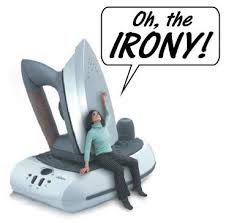
Irony and symbols are two literary objects that an author can use to add depth to a story. While irony has many definitions, the three that are most interesting in the literary sense would be dramatic, tragic, and situational. Dramatic irony is when the reader knows of developments to the story that a main character or characters are unaware of. Tragic irony is employed when characters of the story display actions that are contradictory to their words, or vice versa, with the audience being fully aware of the faux paus, (Hutcheon, 1994, p. 13). Situational irony is a type of irony that exhibits results that are wholly at odds with what was expected to happen.
Whereas irony can have several meanings, symbol has only one: an inanimate object, picture, or word that becomes a representation of another concept, such as a heart drawn on a note might represent love towards the recipient.
D.H. Lawrence uses the symbol of the rocking horse in his short story The Rocking Horse Winner to show the situational irony that occurs between the mother and son. The rocking horse is an escape for the son, Paul, a way to see beyond himself to get what he wants. Due to his mother's own obsession for money, soon that is all Paul wants. Unlike his mother, Paul does not want the money to satisfy himself, but he seeks instead to gain the favor of his mother with money. Ironically, she married for love, but when that withered away, she was left a bitter woman bent on filling her void with material possessions. She could not even find within herself love for her children, lavishing upon them material things, but never love. Paul came to understand that being lucky was synonymous with being rich, two things that his mother lacked but needed in order to be happy.

Using the rocking horse as an omniscient force, he won plenty of money, but it seemed his mother only wanted more and more. Paul became sick with his quest to 'see' the winner of each derby race, eventually leading to his dramatic death. Although he made his mother rich at the end of the story, it appeared that the only thing she cared about was her dying son and
not money. The mother felt love too late to save Paul, and Paul amassed a wealth he had dreamed of at the cost of his life.
Jumpa Lahiri employs the symbols of clothing and food in Hell-Heaven to foreshadow the decisions her main characters will make later in the story. In the beginning of the story, the young Pranab Kaku is drawn to a stranger simply because she is clothed in a fashion familiar to him. Her clothes and way of cooking reminds him of home, thus making him feel safe and cared for. Even so, he falls in love and marries an American girl, shunning his Indian ways. However, after twenty-three years of marriage to the American, Pranab Kaku cheats on her with a fellow Indian woman, a married woman no less. While Pranab Kaku thought he would be happy assimilating into American culture, it was evident from his actions in the beginning of the story that he would only be happy with a woman from his own culture.
Another situational irony present in Hell-Heaven is the dissatisfaction in the marriage of the narrator's parents. Their marriage was arranged in India, and so they did not love each other. Over time, and through Pranab Kaku's indiscretion and divorce, they develop an affection for each other that is akin to love. One other instance of situational irony in the story is how the narrator's mother is jealous of Pranab Kaku's American wife Deborah at first, yet when Deborah is emotionally destroyed over her husband's philandering ways, the narrator's mother is the friend she chooses to turn to.
References: Hutcheon, L. (1994). Irony’s Edge: The Theory and Politics of Irony. London: Routledge

No comments:
Post a Comment